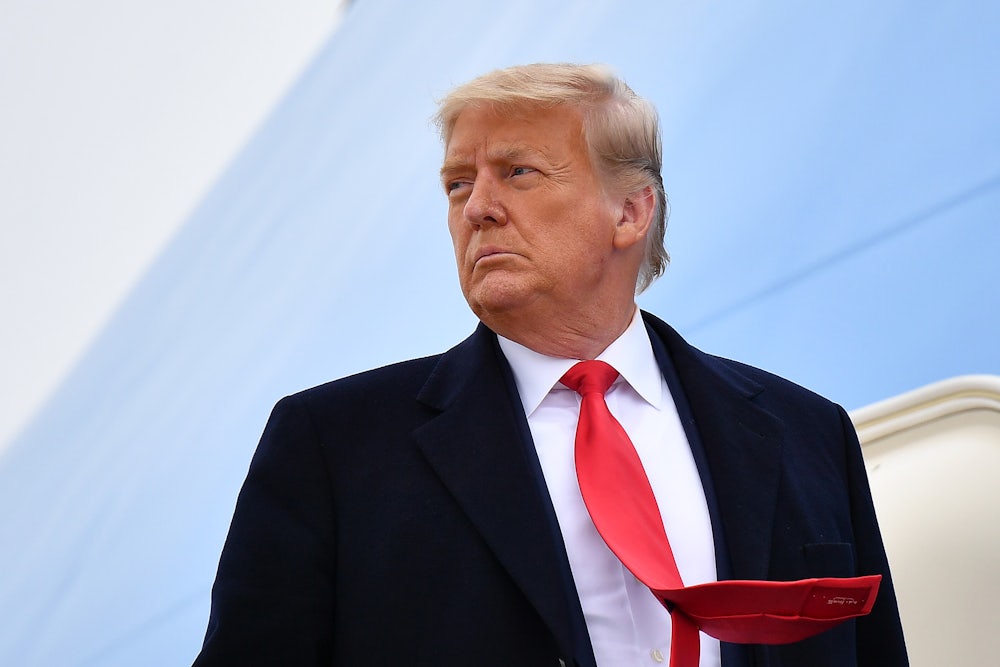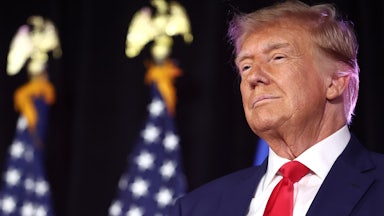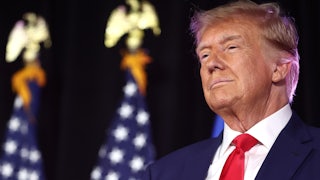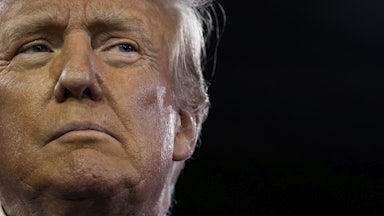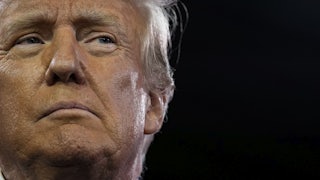Sometime soon—maybe as soon as this week—Donald Trump will be arrested. Again.
The charges Trump is facing from his two prior arrests sparked a dynamic familiar to anyone who has watched his tempestuous political rise: They have wedded Republicans more closely to the former president while simultaneously further alienating Democrats and a minority of Republicans. This is just how things work now: American politics is so defined by hatred and negative partisanship that even blatant criminality won’t turn off a committed base. Just like he once observed, Trump probably could shoot someone on Fifth Avenue and still have a positive approval rating among Republicans.
But a stubborn countervailing force persists as well: the sense that not enough has been done to politically prosecute Donald Trump. Much of that blame for this has been laid at the feet of his fellow Republicans, some of whom refuse to attack him even though they are ostensibly running against him in a presidential primary. But it’s also true that Trump’s first two arrests reinforce long-standing existing narratives about Trump—namely that he acts as if the rules simply don’t apply to him—without adding substantially to them. In both instances, you see Trump’s vanity and frailty but not his maliciousness. (While it is true that Trump endangered national security by keeping classified documents in a bathroom, the most likely explanation for his decision to do so was simply that possessing them made him feel important; he almost certainly paid hush money before the 2016 election not because he thought it would swing the election but because he did not want his wife to find out he had an affair.) In any case, Trump’s sense of entitlement is a double-edged sword: It is a key reason he holds the ardor of some voters firm even as it acts as a repellent to others.
Trump’s third arrest is different. The exact details in the coming indictment are unknown, though it is expected to include charges relating to three federal criminal statutes, including conspiracy to defraud the United States and witness tampering. Special Prosecutor Jack Smith is also expected to charge Trump using a Reconstruction-era statute that makes it a crime to “conspire to injure, oppress, threaten, or intimidate any person” in the “free exercise or enjoyment of any right or privilege secured to him by the Constitution or laws of the United States.” These are charges that get at the heart of the most searing argument that’s been levied against Donald Trump: He is not just crooked, but an existential threat to American democracy. But how can Democrats—and anti-Trump Republicans—prosecute that case?
Former White House press secretary Jen Psaki has an idea. “Stop calling it ‘the January 6 investigation,’” she wrote in a column posted on MSNBC’s website. She has a point: The decision to focus on the most outwardly destructive (and telegenic) aspect of the long, complex plot to overturn the 2020 election has the unintended consequence of understating Trump’s role in it.
“Trump engaged in a sprawling and systematic effort to steal the 2020 election,” Psaki writes. “We have heard and seen evidence that these efforts included defrauding the American public, subverting democratic institutions and coordinating a pressure campaign at the local, state and federal level to overturn the will of the people.” That is to say, while he did not storm the Capitol himself, the actions he took in the weeks and months leading up to that moment—many of them blatantly illegal and all done in service of a coup—led directly to the violence on January 6. Trump did not use bear spray on a police officer that day, but there can be no doubt that none of that would have happened without his actions.
It’s undoubtedly true, as Psaki implies but doesn’t say outright, that Democrats and the media have struggled to form a totemic narrative relating to the attempt to overturn the 2020 election and instead have settled on a double-helix narrative: on one side, Trump’s myriad attempts to use the legal and political systems to invalidate a legitimate election; on the other, a violent assault on the seat of American democracy.
In this way, it’s a tricky story to tell: These two narrative strands proceed in parallel but have esoteric connections. Trump encouraged the attack and deliberately did nothing to stop it, but it is not quite accurate to say he orchestrated it. And it’s hard to quite paint Trump as someone who set out specifically to undermine the constitutional order—he was simply desperate to prove to the world that he was not a loser, and the constitutional order happened to be in his way. Trump might merely be taking (unwitting) advantage of his own seriocomic haplessness. But in any event, Democrats have struggled to adequately and concisely find a way to connect everything that happened between November 3, 2020, and January 6, 2021, in one clear brief against the president.
Smith’s latest charges perhaps present a new opportunity to square this circle. Republicans gave Trump an out when they chose not to convict him for his role in the assault on the Capitol, despite the fact that he had put many of their lives in danger. Smith’s charges present another opportunity to show voters that he was not just actively involved in a number of attempts to overturn the election but also engaged in a number of criminal acts while doing so. Democrats thus have another opportunity to make a larger case that isn’t just about the events of January 6 but rather the far more nefarious activities that were proceeding behind the scenes in the run-up to the attempted sacking of the Capitol: Donald Trump may not have been orchestrating the yahoos, but he was actively working to not just undermine but overthrow American democracy.
Nevertheless, this may be a quixotic goal. There has long been a hope that recasting Trump’s acts of villainy—and, in particular, using the legal system against him—is the key to smelting the magic bullet needed to finally extinguish the malevolent hold he has over our politics; that criminal convictions or impeachment proceedings will break the fever. The charges Trump is facing are likely going to be damning. But the narrative cycle they will spawn is likely to be familiar. Once again, his words and actions will be laundered by allies in politics and the media. As usual, our staid legal system will be short on fireworks and melodrama, its even keel working more slowly than liberals might want and, more importantly, toward different ends than those of Psaki and Trump’s opponents in both parties.
We have seen time and time again that the best way to defeat Donald Trump is not in a court of law but at the ballot box, and the effort is better expended in reminding voters that he is a fraud: Hardly a populist, he governed as a bog-standard Republican plutocrat. That Trump is an existential threat to American democracy is undoubtedly true, but Democrats will nevertheless have to defeat him politically (and, by extension, democratically): The odds that a former president will be jailed before the next election (or, for that matter, at all) are exceedingly low. Smith’s latest set of charges will be another opportunity to remind voters of Trump’s criminality and authoritarianism. But this is a marathon, not a sprint, and the finish line is a long way away and will not end with the clink of a prison cell door slamming shut.
